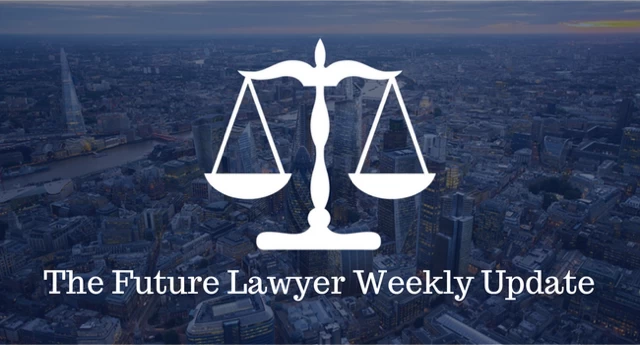
Interview with Raphael Khoo, future Magic Circle trainee
February 3, 2020
Critical Things You Should Remember About Handling Injury Cases
February 4, 2020The round-up of the stories that a budding Student Lawyer should be aware of this week. Sign up here to get these updates in your inbox every week.
Euthanasia case
Doctors acquitted in Belgium Euthanasia case
Reported by Ellena Mottram
Three doctors in Belgium have been acquitted of unlawfully poisoning a woman whose life they helped to end in 2010. The three doctors accused were the doctor who administered the lethal injection, Joris Van Hove, Ms. Nys’s former general practitioner, Frank D, and psychiatrist Lieve Thienpont. All three individuals were required to sign for the procedure to be carried out.
Ms. Nys’s sisters argued she wanted to die because of a failed relationship, not because of an incurable disorder, and therefore did not meet the requirements under Belgium law. The 38-year-old suffered severe psychiatric problems when she was younger but had not received psychiatric treatment for 15 years and had been diagnosed with autism before her death for which she had not been treated.
A twelve-member jury cleared the doctors after eight hours of deliberation. Different reasons were provided for acquitting the three doctors. For the doctor who administered the lethal injection, it was said there was reasonable doubt and when such exists it is in the benefit of the accused. The GP was acquitted as he was not aware the euthanasia would be carried out that day and it was said the psychiatrist had met all the conditions required of her.
The Court acquitted the doctors for the poisoning of 38-year-old Tine Nys in 2010 in the country’s first criminal case concerning euthanasia since it was legalised in 2002. In Belgium, the law allows adults to request the right to die if they are facing unbearable physical or mental suffering caused by a serious and incurable disorder. Additionally, the patient must be legally competent and conscious at the time of the request, which must be voluntary, well-considered and repeated.
It is reported that more than six cases of euthanasia take place in Belgium each day with a total of 2,357 taking place in 2018. Supporters of Euthanasia have however argued it has caused anxiety amongst patients who believe they will not be able to die on their own terms and has made doctors nervous about signing papers for patients or helping them to die.
The news comes in the same week that Phil Newby has his appeal for a judicial review refused. Mr. Newby was diagnosed with Motor Neurone Disease in 2014 and lost his High Court case in November. He appealed the decision asking the court to examine expert evidence before deciding whether the law is incompatible with its human rights. Assisted dying remains illegal in the UK and carries a prison sentence of up to fourteen years.
Trademark Law
Sussex Royal Trade Mark Challenged
Reported by Laurence Tsai
It was only last month when Prince Harry and Meghan Markle – the Duke and Duchess of Sussex (“the Sussexes”) – announced that they would become financially independent from the Royal Family, as well as, step back from their senior positions as members of the Family.
Before their landmark announcement, the Sussexes filed a trademark application for the term “Sussex Royal” with the UK Intellectual Property Office (“UKIPO”) in June 2019 (trademark number UK00003408516) for a range of goods and services, including instructional and teaching materials, clothing and campaigns.
Following recent news from Buckingham Palace that the Sussexes would no longer use their titles “royal highness”, questions have arisen as to whether they may continue to use the Sussex Royal brand; their hopes to trademark their brand has been met with several oppositions. For instance, a Melbourne-based doctor filed an opposition to the UKIPO on 21 January 2020 by way of “notice of threatened opposition”. This opposition has extended the Sussexes’ original period of opposition from 20 February 2020 to 20 March 2020, which provides ample opportunity for other members of the public to raise their objections.
It is a key topic of debate as to whether the Sussexes would be able to continue to use the “royal” moniker if they are not working members of the Royal Family. Many have criticised that they cannot continue with the brand as they have relinquished their royal credentials. Crucially, the UKIPO trademark examination manual does not prohibit the term “royal” in all circumstances (section 4(1)). Examples that might be problematic for the Sussexes if their brand covers such goods and services include high-quality porcelain and glassware, luxury goods or medical and charitable services (section 4(1)(d)). The term may also indicate patronage or authorisation when linked to high-value goods but not to everyday items. However, any objections against the Sussexes’ trademark under section 4(1)(d) can be overcome if they obtain the consent of the Queen or the Lord Chamberlain.
Consent must include an agreement to the use and registration of the royal element as a trademark.
Accordingly, Lee Curtis, a chartered trademark attorney, states that the critical question is whether the Sussex Royal brand would fall under such prohibitions and whether the change in their royal status directly impacts on their trademark application. He provides an optimistic view to the Sussexes’; position and states that as they are still members of the Royal Family and, although they have announced that the will no longer use the term “royal highness”, this does not affect their positions as members of the Family. Assuming Curtis’; view is correct, then the couple may have a robust stance against any opposition to their new brand name. However, it should be noted that the Australian doctor’s notice suggests that a formal opposition to the Sussexes’ trademark application may be looming, yet only time will tell whether any parties will raise formal oppositions and argue because the Sussexes have decided to step down from their royal duties. Should any parties formally oppose the application, it may force the Sussexes to enter into an expensive and complicated legal battle for the Sussex Royal brand.
Bribery
Airbus to pay the highest settlement record of £3bn worldwide for alleged bribery
Reported by Jutha Cheewat
It was decided at the Royal Courts of Justice that Airbus will pay more than £800 million for suspension of prosecution, alleged bribery, and corruption in the UK. It faces other fines in France and the US.
The allegation was related to one of Airbus’s departments, contracting for aircraft sales.
Airbus was charged for failure to prevent bribery under the Bribery Act 2010, both for commercial and military aircraft deals. According to the barrister for the UK’s Serious Fraud Office (SFO), Allison Clare, the fine consists of the disgorgement of profits and a financial penalty. The sum was said to have “exceeds the combined sum of all previous UK DPAs.”
Airbus also agreed to pay France and the US governments similar amounts.
President of the Queen’s Bench Division, Dame Victoria Sharp, said “The seriousness of the criminality in this case hardly needs to be spelled out. As is acknowledged on all sides, it was grave.” It was “endemic in two core business areas within Airbus”.
According to the Independent, reaching a settlement may be seen as another high-profile failure. Nevertheless, the involved authorities, in various countries, are pursuing similar investigations, including the SFO in regard to the eight-year-long investigation into Airbus illicit payments.
You can find more here or here.
Terrorism law
Retrospective application for terrorism sentence may be applied
Reported by Emma Ducroix
Sudesh Amman was shot dead by police in Streatham on Sunday after stabbing two people. The 20-year-old had been freed after serving half of his sentence of more than three years for the possession and distribution of extremist material and was under active police surveillance.
Prisoners already jailed for terrorism offences could face retrospective changes to their sentences to deny them early release.
The prime minister said the government could go down the potentially legally tricky route of changing release conditions for those already in jail, following two recent incidents involving released Islamist attackers.
After a man with a similar sentencing history killed two people at London Bridge in November, Johnson promised to change the law to end automatic early release for those convicted of terrorism offences.
On Monday he said this could now be applied to those already in jail.
“I hope people understand that the anomaly we need to clear up is the process by which some people are still coming out under automatic early release without any kind of scrutiny or parole system”, Johnson declared.
“We need to think about how we handle that in our criminal justice system.”
Speaking earlier, the chief secretary to the Treasury, Rishi Sunak, rejected the idea that cuts to prison and probation services had made it harder to rehabilitate or monitor terrorism suspects.
He told BBC1’s Breakfast: “The counter-terrorism budget, which is what we’re dealing with here, has actually been increased every year for the last five or six years.
He said the government was doubling the number of specific counter-terrorism probation officers and creating new places in probationary hostels.”
The London mayor, Sadiq Khan, said: “I’m not just frustrated but I’m angry at the changes made in the past and the lack of progress in making the changes we were promised in November.”
Mobile phone footage of the incident showed officers wearing plain clothes arriving on the scene at high speed, firing about five gunshots and killing Amman outside a branch of Boots pharmacy. They were carrying pistols that are normally used by surveillance officers.
Amman pledged allegiance to Islamic State in messages to his girlfriend at the time he was jailed and said he wanted to carry out terrorist attacks.
He wrote to her: “If you can’t make a bomb because family, friends or spies are watching or suspecting you, take a knife, Molotov, sound bombs or a car at night and attack.”
Find out more here.




